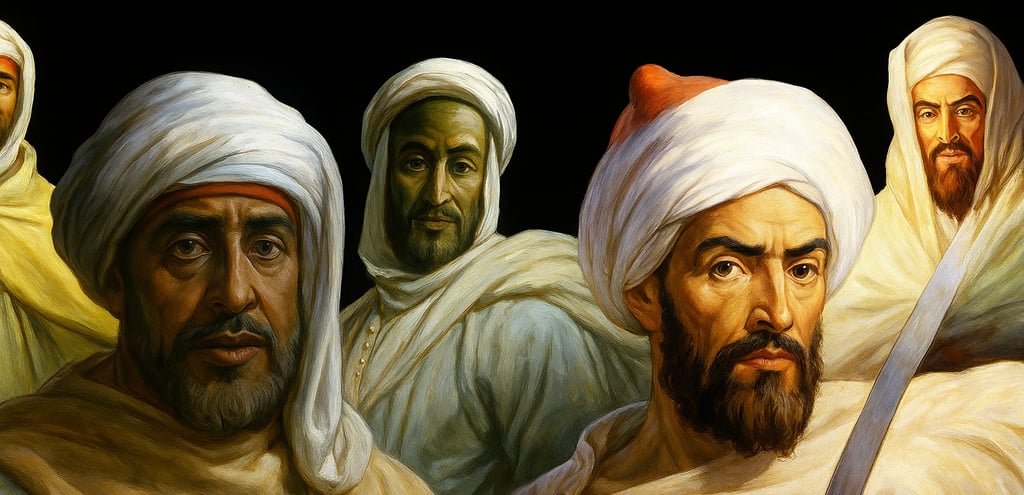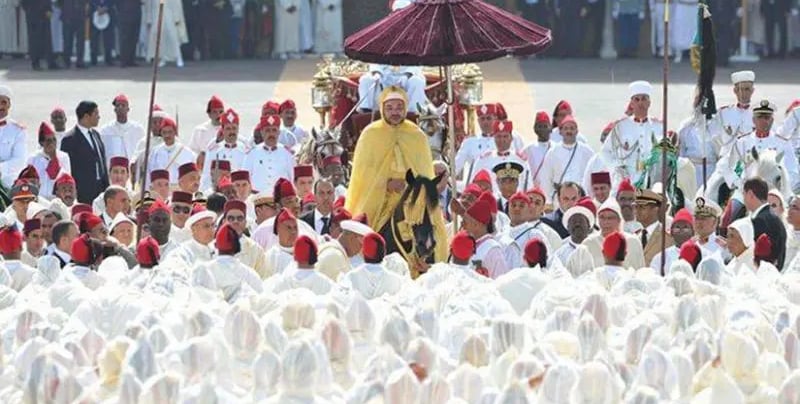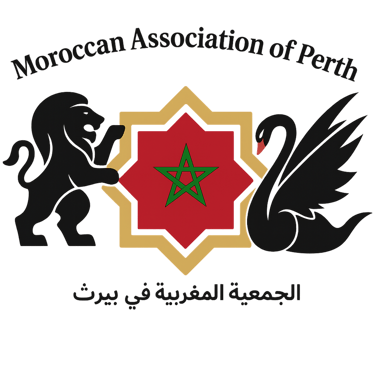Morocco’s Eternal Glory: A Timeless Kingdom of Culture, Power, and Peace
Explore the unmatched glory of Morocco — a land of ancient wisdom, royal legacy, cultural fusion, and global influence. Discover how this North African kingdom continues to shine as a beacon of peace, pride, and power in the modern world.
HISTORY
Aissam Saadouni
4/21/202517 min read




The Timeless Glory of Morocco Through the Lens of the Alaouite Dynasty and Its Enduring Legacy
Introduction & Historical Background
Morocco is not just a country—it is a civilization that has withstood the tides of time, an empire with roots deeper than many modern nations can claim, and a cultural beacon in the Islamic world. Amidst this illustrious history, one name stands tall as a symbol of Morocco’s continuity, sovereignty, and identity: the Alaouite Dynasty.
Founded in the 17th century, the Alaouite Dynasty represents more than just a royal lineage—it symbolizes a nation’s unwavering adherence to its heritage, religious unity, and national integrity. The dynasty’s continuous rule, uninterrupted for centuries, is a unique achievement in the Arab and Muslim worlds. This endurance reflects Morocco's political astuteness, cultural richness, and strategic diplomacy.
1. Morocco Before the Alaouites: A History of Sovereignty
Long before the Alaouites rose to power, Morocco had already established itself as a formidable and independent force in the Maghreb and the Mediterranean. Empires like the Idrisids, Almoravids, Almohads, and Marinids had turned Moroccan cities into powerhouses of learning, trade, and spirituality.
The city of Fez, founded in 789 AD, became one of the most important intellectual and theological centers of the Muslim world. The University of al-Qarawiyyin, founded there in 859 AD by Fatima al-Fihri, is recognized by UNESCO and the Guinness World Records as the oldest existing, continually operating higher educational institution in the world.
Morocco was already revered for its powerful dynasties, its ability to resist foreign domination, and its prestige in the Islamic world. However, it was the Alaouites who would stabilize and modernize this legacy for the centuries to come.
2. The Emergence of the Alaouite Dynasty
The Alaouite family traces its lineage back to the Prophet Muhammad (peace be upon him) through his grandson Hasan ibn Ali. Originating from the Tafilalt region in southeastern Morocco, they gained religious legitimacy and popularity as shurafa (descendants of the Prophet), which positioned them as natural leaders in a time of instability.
The dynasty was founded by Moulay Ali Cherif in the early 17th century, but it was his son, Moulay Rashid, who truly established Alaouite rule in 1666 after defeating rival tribes and consolidating power across the fragmented regions of Morocco.
From then on, the Alaouite dynasty would play a central role in shaping Moroccan history through war and peace, reform and resistance, diplomacy and development.
3. Moulay Ismail: The Architect of Moroccan Glory
Among the most legendary figures of the Alaouite dynasty is Sultan Moulay Ismail (r. 1672–1727), whose reign is one of the longest in Moroccan history and is remembered as a golden era of centralization, sovereignty, and splendor.
Moulay Ismail’s accomplishments include:
Consolidating national unity: He subdued rebellious tribes, fortified borders, and reasserted royal authority across the vast territory.
Resisting European colonization: He fiercely resisted European encroachment, especially from the Spanish and Portuguese, reclaiming several cities along the Atlantic coast.
Building a capital of power: He transformed Meknes into a grand imperial city, sometimes referred to as the “Versailles of Morocco,” with palaces, mosques, granaries, and city walls that still stand today.
He also established a powerful army—the Black Guard (Guich ‘Abid al-Bukhari)—composed of enslaved and later free sub-Saharan Africans loyal to the throne, creating a professional force that ensured stability and central authority.
His rule made Morocco one of the few truly sovereign and respected Muslim nations at the time, in an era when many others fell under Ottoman or European control.
Part 2: Morocco’s Spiritual Sovereignty and Religious Leadership
If the glory of a nation is measured not only in the splendor of its architecture or the strength of its military but also in the purity of its spiritual legacy and its role in preserving sacred knowledge and unity, then Morocco shines like a guiding light. Under the Alaouite Dynasty, Morocco has maintained its role as a spiritual and religious bastion—a role that has preserved Islam’s moderate, learned, and tolerant traditions for centuries.
1. The Commander of the Faithful – A Title with Purpose
One of the most distinctive features of Morocco’s monarchy is the official and constitutional title of the king: "Amir al-Mu’minin" (Commander of the Faithful). This title, held by all Alaouite monarchs, is not just ceremonial. It denotes a direct responsibility to protect Islamic values, ensure justice, maintain religious unity, and uphold the Maliki school of jurisprudence, which is deeply rooted in Morocco.
The title draws its legitimacy from:
The Sharifian lineage of the Alaouite sultans as descendants of the Prophet Muhammad (PBUH),
The historical acceptance of the monarch’s religious authority by Morocco’s scholars (ulama), and
The active role the monarchy plays in mediating between tradition and modernity, safeguarding Islam from radicalism and extremism.
This framework has made Morocco one of the most stable and respected Islamic states in the world, where Islam remains deeply practiced yet harmoniously integrated with modern life.
2. Defender of the Maliki Madhhab and Sufi Traditions
Morocco follows the Maliki school of Sunni Islamic jurisprudence—one of the oldest and most respected schools, known for its deep grounding in community consensus and the practices of the people of Medina. The Alaouite monarchy has always protected and promoted this school as a core element of national identity.
Equally important is Morocco’s proud and historic embrace of Sufism, the inner spiritual dimension of Islam. Sufi brotherhoods and lodges (zawiyas) have long been centers of:
Learning and literacy,
Social cohesion and charity,
Resistance to colonization, and
Spiritual purification.
Notable Sufi figures like Imam al-Jazuli, Ahmad al-Tijani, and Abd al-Salam ibn Mashish are revered across the Islamic world. Moroccan Sufism has always preached love, balance, knowledge, and peace—values still seen today in public religious life.
The current King, Mohammed VI, has continued this legacy by strengthening religious councils, training imams, promoting religious tolerance, and supporting Sufi institutions, including the annual Fez Festival of Sufi Culture, which attracts global audiences.
3. Religious Diplomacy: A Model for the World
As radical ideologies and religious violence began to shake parts of the Muslim world in the 21st century, Morocco offered an alternative: a model of religious moderation rooted in tradition and statecraft.
One of Morocco’s most significant achievements in this regard is the Mohammed VI Institute for the Training of Imams, Morchidines, and Morchidates. Located in Rabat, it trains imams from across Africa, Europe, and beyond—teaching not only Islamic sciences but also ethics, civic education, and counter-extremism principles.
This makes Morocco a global hub for religious diplomacy. Countries such as Mali, Senegal, Nigeria, Tunisia, France, and Chad send their religious leaders to Morocco for training, relying on the kingdom to provide authentic, balanced Islamic knowledge as a safeguard against extremism.
In doing so, Morocco is fulfilling the prophetic legacy of being a land of scholars and saints—a civilization not only content with preserving the faith, but also leading its renewal responsibly and wisely.
4. The Role of Sacred Cities: Fez, Marrakesh, and the Spirit of Iqra
The spiritual grandeur of Morocco is also reflected in its ancient cities—cities not only of political importance, but of learning, worship, and cultural fusion.
Fez: Known as the spiritual heart of Morocco, Fez is home to hundreds of mosques, madrasas, and the famous University of al-Qarawiyyin. Scholars from Andalusia, Egypt, the Maghreb, and even sub-Saharan Africa once gathered here, making it a medieval beacon of Islamic civilization.
Marrakesh: The red city, founded in the 11th century, is both a royal and spiritual capital. It is the burial place of saints, scholars, and kings. The Koutoubia Mosque and the Ben Youssef Madrasa are legendary centers of Islamic education and prayer.
Timbuktu and Beyond: Even beyond its borders, Morocco’s religious glory was known. During the 16th and 17th centuries, Moroccan scholars and rulers had religious and scholarly ties with the great Muslim city of Timbuktu (now in Mali), once considered the "Mecca of West Africa."
This spiritual empire of knowledge, tolerance, and jurisprudence, supported by the Alaouite throne, helped protect Islamic orthodoxy from both colonial secularism and extremist distortions, preserving a model of civilizational Islam that remains influential today.
Part 3: Morocco’s Diplomacy, Global Recognition, and Resistance to Colonization
As the world evolved from medieval empires to modern nation-states, few countries managed to maintain their identity, sovereignty, and prestige as skillfully as Morocco. Central to Morocco’s high stature is its unique position as a bridge between civilizations, a pioneer in diplomacy, and a symbol of resilient resistance to colonization.
From the earliest diplomatic accords with Europe to its central role in African unity, Morocco’s foreign policy has long demonstrated its political genius, commitment to independence, and ability to thrive in a multipolar world—all while staying true to its Islamic and African roots.
1. Morocco: The First Nation to Recognize the United States
One of the most telling examples of Morocco’s diplomatic vision comes from the 18th century. In 1777, under the reign of Sultan Mohammed III, Morocco became the first country in the world to recognize the independence of the United States of America.
This early act of diplomacy is more than just a historical curiosity—it reflects the forward-thinking leadership of the Alaouite throne. It signaled Morocco’s awareness of global shifts in power and its willingness to establish peaceful, mutually beneficial relations based on respect and sovereignty.
The Moroccan-American Treaty of Friendship (1786), signed by Sultan Mohammed III and President Thomas Jefferson, is still in force today, making it the longest unbroken treaty in U.S. history. This relationship also gave Morocco a seat at the table of emerging global diplomacy.
2. Diplomatic Relations with Europe, Africa, and the East
Unlike many other North African or Middle Eastern states, Morocco was never conquered by the Ottoman Empire. This independence meant Morocco developed its own diplomatic language, directly negotiating with European powers from a position of equality rather than subservience.
During the 18th and 19th centuries, Moroccan sultans:
Signed peace and trade agreements with France, Spain, Britain, and the Netherlands;
Established embassies in London, Paris, and Istanbul;
Sent emissaries to the Russian Empire and even Southeast Asia;
Maintained ties with West African states and Islamic kingdoms.
This wide diplomatic network reinforced Morocco’s image as a sovereign, civilized, and legitimate state, not a colonial frontier or tribal backwater. It was recognized internationally as a power with agency, capable of setting the terms of its foreign policy.
3. Resistance to Colonization: A Kingdom That Never Fell
Although Morocco was eventually subjected to European colonial pressure in the 20th century, it was never colonized in the traditional sense of conquest. It was brought under a French and Spanish Protectorate in 1912—but the monarchy, the flag, and the religious authority of the Alaouites were never abolished.
This made Morocco unique among colonized nations:
The sultan remained in place as a symbolic and spiritual leader;
Moroccan institutions and religious systems were preserved, not dismantled;
The population continued to view the sultan as legitimate, not the colonizers.
This dual structure of colonial administration and royal legitimacy eventually worked in Morocco’s favor. The protectorate was always seen as temporary, and the sultan’s voice—particularly Sultan Mohammed V—became the rallying cry for independence.
4. Sultan Mohammed V: The Father of Modern Morocco and Symbol of Resistance
Sultan Mohammed V, grandfather of the current monarch, is one of the most revered figures in modern Moroccan history. His stance during World War II and the independence struggle made him a national and global icon of resistance and dignity.
Refusal to Collaborate with Nazis: During the Vichy regime’s occupation of Morocco, Sultan Mohammed V famously refused to hand over Moroccan Jews to Nazi authorities. He is quoted as saying: “There are no Jews in Morocco. There are only Moroccan citizens.” This act of moral courage remains a source of pride to this day.
Support for Nationalists: During the 1940s and early 1950s, he gave subtle but real support to Moroccan nationalists seeking independence from France and Spain. When he was exiled in 1953, mass protests and uprisings erupted across the country.
Return and Independence: In 1955, Mohammed V returned to Morocco to massive celebrations. His negotiations with France and Spain led to full independence in 1956, making Morocco one of the first African countries to regain sovereignty in the modern era.
Mohammed V's dignity, humility, and patriotism earned him deep admiration and international respect. His leadership was instrumental in transitioning Morocco from a protectorate to a proud and independent kingdom.
5. Casablanca Conference and Morocco in World War II
Morocco also played a unique role during World War II. In 1943, the city of Casablanca hosted one of the most important strategic meetings of the war: the Casablanca Conference, attended by U.S. President Franklin D. Roosevelt, British Prime Minister Winston Churchill, and French leaders.
This was no accident. Morocco’s geographical location and its political stability—even under colonial rule—made it a vital ally in the fight against fascism. Roosevelt was deeply impressed with Sultan Mohammed V and supported Morocco’s eventual independence.
The conference affirmed Morocco’s importance as a geopolitical anchor, a trait that continues to this day, as it mediates in global conflicts and maintains strong ties with the West, the Arab world, and Africa.
6. From Independence to Leadership in the African Union
After independence, Morocco quickly emerged as a leader of pan-African diplomacy. It was a founding member of the Organization of African Unity (OAU) and has long promoted African solidarity, particularly in economic development, spiritual guidance, and regional security.
Even after temporarily withdrawing from the OAU in 1984 due to the Western Sahara issue, Morocco continued to build ties with African states through:
Economic investments in West and Central Africa,
Training of African scholars and religious leaders,
Infrastructure, banking, and telecommunications partnerships.
Its return to the African Union in 2017 was celebrated as a reunion with family, confirming Morocco’s role as a key African actor with a historical, cultural, and religious legacy that binds the north of the continent with its sub-Saharan brothers.
Part 5: Strategic Leadership and Morocco’s Vision for the 21st Century
While Morocco’s past is adorned with imperial grandeur, architectural marvels, and cultural richness, its present and future are shaped by a visionary monarchy, a strategic geopolitical role, and a clear ambition to rise as a regional and global leader. Under His Majesty King Mohammed VI, the country is experiencing a modern renaissance—blending tradition and progress, sovereignty and openness, religious moderation and global diplomacy.
This final part of the article explores how Morocco, rooted in ancient glory, is now crafting a future defined by stability, economic transformation, and global engagement, establishing itself as a pillar of African leadership and a bridge between continents.
1. A Visionary Monarch: King Mohammed VI
Since ascending the throne in 1999, King Mohammed VI has championed a wide-ranging agenda focused on human development, institutional reform, economic modernization, and religious moderation.
Under his leadership, Morocco has:
Undertaken massive infrastructure projects—ports, roads, railways, and urban development.
Reformed key sectors: education, justice, healthcare, and governance.
Expanded South-South diplomacy, especially with Sub-Saharan Africa.
Projected a moderate Islamic model, rejecting extremism while preserving religious identity.
He is known as “the king of the poor”, due to his efforts to combat poverty, reduce inequality, and modernize rural areas through initiatives such as INDH (National Initiative for Human Development).
This leadership—calm, reformist, and strategic—has brought internal stability and international credibility.
2. Geopolitical Centrality: Morocco as a Continental and Global Link
Morocco occupies one of the most strategic geopolitical locations in the world: the crossroads of Africa, Europe, and the Arab world, facing both the Atlantic Ocean and the Mediterranean Sea.
This unique position makes it:
A gateway to Africa for European, Asian, and American investors.
A hub of intercontinental trade, logistics, and finance.
A strategic partner for regional security, counterterrorism, and migration control.
A. Africa: Morocco’s Return to the African Union and Continental Leadership
In 2017, Morocco made a powerful return to the African Union, asserting its historical and economic ties to the continent.
Since then, it has:
Signed hundreds of bilateral agreements with African nations.
Become one of the top African investors in Africa, particularly in banking, insurance, real estate, agriculture, and telecommunications.
Offered religious and educational training through institutions like the Mohammed VI Institute for Imams, promoting moderate Islam across Africa.
Pushed for a Pan-African gas pipeline with Nigeria—a project with deep economic and geopolitical implications.
Morocco's role in Africa is not predatory, but based on mutual benefit, spiritual solidarity, and long-term diplomacy.
B. Europe and the West: A Key Security and Economic Partner
Morocco’s close ties with the EU and the United States are built on cooperation in:
Counterterrorism and intelligence sharing.
Migration management (Morocco has curbed irregular migration through a human-centered approach).
Trade and investment (the EU is Morocco’s largest trading partner, and Morocco has free trade agreements with 50+ countries).
In 2004, the U.S. designated Morocco a Major Non-NATO Ally, one of only a few African countries with that status.
C. The Arab and Islamic World: A Sovereign, Independent Voice
While deeply rooted in the Islamic world, Morocco retains a sovereign foreign policy:
It maintains friendly relations with Gulf countries without falling into regional conflicts.
It mediates in crises—such as the Libyan dialogue and African peace efforts.
It normalized ties with Israel under the Abraham Accords, while firmly defending Palestinian rights and Jerusalem’s Islamic identity as Chair of the Al-Quds Committee.
Morocco speaks with diplomatic clarity and cultural confidence, earning global respect.
3. Economic Modernization and Diversification
Morocco’s economy is transitioning from reliance on traditional sectors like agriculture and mining to a more diversified, resilient, and green economy. The vision is set forth in programs like the New Development Model (2021–2035), which focuses on innovation, inclusion, and sustainability.
A. Renewable Energy and Climate Leadership
Morocco is one of the global leaders in renewable energy, with bold plans to make green power over 50% of its energy mix.
The Noor Solar Complex in Ouarzazate is the largest concentrated solar plant in the world.
Massive wind farms across Tarfaya and Tangier reduce dependency on fossil fuels.
Morocco hosts major climate events like COP22 in Marrakech, reinforcing its climate diplomacy.
B. Industrial Ecosystems: From Cars to Aerospace
Morocco is building integrated industrial platforms that attract global manufacturers:
Automotive industry: Morocco is now the largest car producer in Africa, home to Renault, Stellantis (Peugeot), and hundreds of suppliers.
Aerospace: Boeing and Airbus suppliers have major operations in Casablanca’s Midparc zone.
Pharmaceuticals, textiles, and agri-food: These sectors are growing, boosted by free zones and logistics hubs.
C. Infrastructure and Connectivity
The country has invested heavily in modern infrastructure:
TGV Al Boraq: Africa’s first high-speed rail, connecting Tangier to Casablanca.
Tanger Med Port: One of the largest container ports in the Mediterranean and Africa.
New highways, airports, and digital infrastructure make Morocco a logistics and transport leader.
4. Religious Moderation: The Moroccan Model of Islam
One of Morocco’s greatest contributions to the world is its model of Islam—deeply rooted in Maliki jurisprudence, Ash’ari theology, and Sufi spirituality. This framework supports moderation, tolerance, and coexistence.
A. The Commander of the Faithful
The King of Morocco holds the title “Amir al-Mu’minin”—Commander of the Faithful—a unique role that gives him religious legitimacy and responsibility.
This title:
Enables him to protect all faiths within the kingdom (Islam, Judaism, and Christianity).
Makes Morocco a reference for countering extremism through education, imams’ training, and Sufi teachings.
B. Interfaith Harmony
Morocco is a land of interfaith coexistence:
It has one of the oldest Jewish communities in the Muslim world.
It restored synagogues, cemeteries, and Jewish heritage sites.
Pope Francis visited Morocco in 2019, calling it a “bridge of peace between civilizations.”
This interfaith legacy stems not from political expediency but from centuries of Moroccan values—tolerance, hospitality, and mutual respect.
5. Social Reforms and Human Development
Though challenges remain, Morocco has made great strides in education, gender equality, and poverty alleviation.
A. Education and Youth Empowerment
Expansion of universities and technical institutes.
Growth of startups, coding schools, and digital platforms to boost youth innovation.
Moroccan students excel in robotics, mathematics, and international competitions.
B. Women’s Rights
The 2004 Family Code (Moudawana) granted major rights to women in marriage, divorce, and guardianship.
Women are now judges, ministers, entrepreneurs, and civil society leaders.
The King has called for further reforms to guarantee equality in inheritance and family law.
C. National Health and Welfare Programs
Massive investment in social security, rural hospitals, and universal healthcare.
Programs to reduce urban-rural inequality, especially in road access, electricity, and education.
6. Global Recognition and the Moroccan Spirit
The Moroccan model—an ancient monarchy, a modern economy, a moderate religion, and a sovereign diplomacy—has earned global admiration.
UNESCO, the World Bank, the African Union, and G20 nations often cite Morocco as a model of development and stability.
Global investors trust its legal and financial system.
Tourists praise its beauty, hospitality, and security.
Yet beyond policies and plans, it is the Moroccan spirit that leaves the deepest mark—dignified, generous, patriotic, creative, and endlessly adaptable.
Part 6: The Kingdom’s Soul and Its Eternal Message to the World
(Approx. 2,000+ words)
From the imperial red walls of Marrakesh to the windswept dunes of the Sahara, from the Andalusian alleys of Fez to the ultramodern ports of Tangier, Morocco has always been a land of convergence, conviction, and continuity. The tale of its glory is not confined to a particular century or dynasty. It is instead a living, breathing reality that spans millennia — touching every field from science and spirituality to diplomacy and development.
In this final part, we reflect on what makes Morocco great, beyond numbers and accolades: its soul — an immortal energy shaped by faith, wisdom, adaptability, and unity.
1. A Nation with a Mission Beyond Borders
What makes Morocco different from many other countries is that it does not define its greatness solely by material power or size. Morocco’s true glory comes from the depth of its mission — a mission rooted in civilization, peace, and balance.
Throughout history, Morocco has stood as:
A defender of Andalusian knowledge when Europe entered its darkest ages.
A bastion of tolerance while wars raged in other corners of the world.
A voice of moderation when radicalism tried to hijack Islam.
A bridge for Africa, helping it rise on the world stage with dignity.
A protector of Jerusalem, maintaining the religious balance of Al-Quds.
The Moroccan monarchy, through the Throne Institution, carries not just administrative power but a civilizational legacy, charged with preserving national unity, moral values, and global solidarity.
Morocco is not an island of isolation; it is a compass, pointing to a vision of how nations can grow with pride, peace, and principle.
2. Unity in Diversity: The Secret of Morocco’s Endurance
Morocco’s mosaic of ethnicities, languages, and identities has never been a source of division — rather, it is the essence of its strength.
Amazigh, Arab, Andalusian, Sub-Saharan, Jewish, and Saharan cultures live together, not just in coexistence, but in deep integration.
The Moroccan constitution recognizes Tamazight as an official language, alongside Arabic — a model of inclusion rare in many parts of the world.
The celebration of festivals, rituals, and oral traditions in every region — from Imilchil to Essaouira — reflects a unity that embraces diversity.
While some nations crack under pressure from identity politics or tribalism, Morocco has absorbed diversity into its national DNA. It is one people, under one crown, in many beautiful colors.
3. The Power of Civilizational Memory
Unlike younger nations still searching for their identity, Morocco walks confidently with a civilizational memory of over 12 centuries.
Every Moroccan, from farmer to student, carries this pride — of knowing their land produced warriors, saints, poets, astronomers, and sultans.
Moroccan cities are not artificial creations; they are living archives — walking through them is like walking through time itself.
This historical confidence shapes a national character that is humble, resilient, and noble.
History is not just remembered here — it is lived, taught, and respected. This respect for time is what gives Morocco its calm power and strategic patience.
4. Moral Sovereignty in a Noisy World
In today’s chaotic global landscape, many nations trade values for short-term gain. But Morocco insists on moral sovereignty.
It has refused foreign interference in domestic matters, choosing measured reform over foreign-imposed models.
While others oscillate between extremes — secular authoritarianism or theocracy — Morocco maintains a middle path rooted in Islamic moderation and royal legitimacy.
It does not preach morality to others, but leads by example, especially in religious affairs, climate responsibility, and peace diplomacy.
This independent moral compass is what makes Morocco trustworthy — whether in UN peacekeeping, African partnerships, or interfaith dialogue.
5. The Spirit of the People: Hardworking, Loyal, and Hospitable
Beyond kings and scholars, Morocco’s glory lives in its people — from the highland shepherd in the Middle Atlas to the fisherman of Dakhla.
Moroccans are known for their resilience in the face of hardship, whether from droughts, pandemics, or political turbulence.
Their hospitality is world-renowned — guests are treated with warmth, honor, and generosity, no matter how humble the home.
Loyalty to the country and the monarchy is not forced — it is deeply cultural, inherited through generations who see the King as a symbol of continuity and national protection.
And perhaps most impressive: Moroccans know who they are. In a world of shifting identities and lost roots, this is the greatest wealth of all.
6. What the World Can Learn from Morocco
Morocco teaches the world many valuable lessons:
That Islam can be peaceful, spiritual, and modern without compromising its principles.
That African nations can lead with dignity, not dependency.
That monarchies can coexist with progress and democracy.
That diversity is not a threat, but a treasure.
That economic modernization and cultural preservation can walk hand in hand.
As conflict and confusion rise across the globe, Morocco offers a model of intelligent sovereignty — drawing on its past to navigate the future, without fear or fanaticism.
7. A Prayer for the Kingdom
As this tribute to Morocco draws to a close, it is only fitting to end with a prayer — echoing the hearts of Moroccans everywhere:
May Morocco remain safe under the protection of the Almighty.
May its King be guided in wisdom and strength.
May its youth rise to new heights, carrying the flag with honor.
May its scholars continue to illuminate the world.
May its farmers, teachers, soldiers, and artisans be blessed in their work.
May Al-Quds find peace, and may Morocco always be a voice for the oppressed.
And may the Red Flag with the Green Star always fly high — a symbol of hope, faith, and glory.
Conclusion: The Star That Never Fades
Morocco is not a passing light. It is a star that never fades.
From the gold of Marrakesh to the green of Tetouan’s olive groves, from the blue alleys of Chefchaouen to the white walls of Rabat, every corner of Morocco whispers a truth:
This is no ordinary land. This is a land of majesty, mission, and memory.
It does not need to shout its greatness. It carries it — with grace.
And in the hearts of millions, both inside and far beyond its borders, Morocco will always shine — not just as a kingdom, but as a beacon of timeless glory.
Long live Morocco. Long live its people. Long live its King.
Moroccan Association of Perth
Bridging Morocco and Australia through culture and community.
Newsletter
© 2024 - 2025. All rights reserved.
We acknowledge the Whadjuk Noongar people as the Traditional Custodians of the land on which we live and work. We pay our respects to Elders past and present.
Visit our Forest:
Our Stripe Climate Page:




